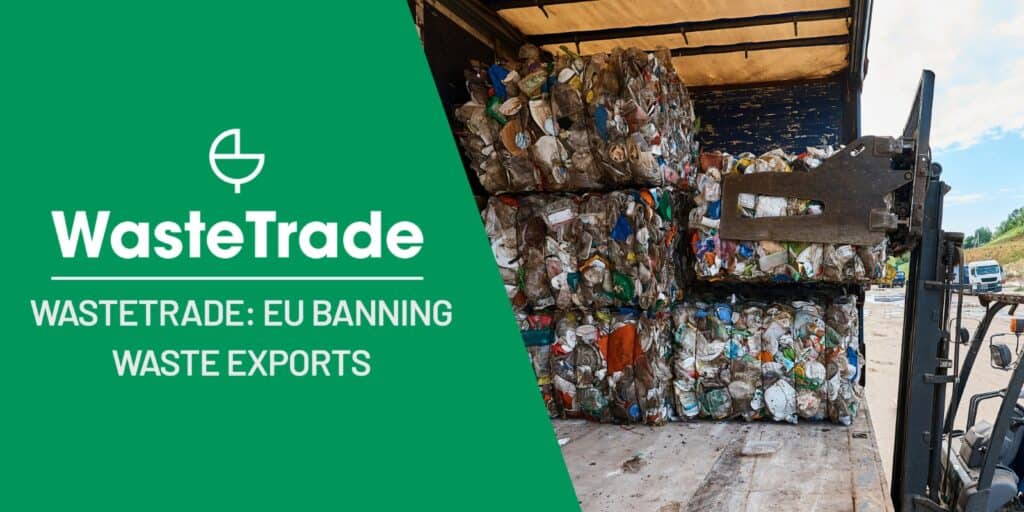Лис 29, 2023
EU to Ban Plastic Waste Exports to Non-OECD Countries

In an effort to combat environmental challenges, the European Commission and the European Council have reached an agreement to ban the export of plastic waste from the European Union (EU) to non-OECD (Organisation for Economic Co-operation and Development) countries. This decision marks a significant stride in the EU’s environmental policy.
Comprehensive Agreement on Waste Shipments
The Commission welcomes this political agreement, aimed at halting the export of plastic waste from the EU to non-OECD countries. The new regulation establishes that after a five-year period, non-OECD countries may only receive plastic waste exports if they meet “strict environmental conditions”. This provision aims to ensure that waste processing in these countries does not lead to further environmental degradation.
New Standards for Waste Exports
Under the new framework, EU countries will be restricted from exporting other recyclable waste to non-OECD countries unless these countries can demonstrate the capability to manage the waste in a sustainable manner. These stringent regulations are part of the EU’s broader goal to mitigate environmental pollution and degradation caused by improperly managed waste, particularly in developing countries.
Insights from the Environment Commissioner
Virginijus Sinkevičius, Commissioner for Environment, Oceans and Fisheries, emphasised the importance of this agreement: “The agreement reached today by the two institutions shows our joint commitment to take responsibility for our waste challenges, rather than exporting our problems abroad. Once in force, the new rules will ensure that waste is shipped for use as a resource, increasing the security of supply of raw materials for industry. Businesses and national authorities will benefit from more efficient and digitalised procedures. We will also step up EU’s response against waste trafficking, combating one of the most harmful environmental crimes.”
Ensuring Compliance and Monitoring
The Commission will closely monitor waste exports to OECD countries and will take necessary action if such exports contribute to environmental problems. EU companies exporting waste will be required to verify that the facilities receiving the waste adhere to environmentally sound management practices, as evidenced by independent audits. This measure is crucial for maintaining the integrity of the EU’s waste management policies.
Advancing Circular Economy Objectives
The circulation of waste materials for recycling and reuse within the EU is integral to the region’s transition to a circular economy. This approach not only addresses the issue of waste management but also contributes to the security of raw material supplies. The new regulation is a key component in achieving the EU’s circular economy goals, ensuring that waste is not merely disposed of, but is repurposed and reused in a manner that benefits both the environment and the economy.
Next Steps for Formal Adoption
The European Parliament and the Council are now tasked with formally adopting the regulation in line with the political agreement. Once adopted, the regulation will become effective 20 days after its publication in the Official Journal, marking a new era in the EU’s environmental policy.
WasteTrade Perspective
WasteTrade, a leader in the global waste management industry, supports action designed to increase the rates of recycling and keep waste out of landfill and the natural environment. WasteTrade is committed to promoting recycling, environmental protection, and the advancement of the waste industry. The company views these new regulations as potentially being a crucial step towards fostering a more sustainable and responsible approach to waste management.
WasteTrade believes that the EU’s initiative will significantly contribute to reducing global environmental pollution and encourage other regions to adopt similar measures. The snowball effect of this could be a restructuring of the global waste industry in such a way that it prioritises repurposing waste back into economic resources. However, WasteTrade emphasises the importance of supporting the recycling industries EU and OECD countries. If these economies are not equipped to deal with the waste they produce, then the issues of waste crime and environmental degradation will simply be moved, not solved.
As a company, WasteTrade is dedicated to facilitating effective recycling processes and responsible waste management practices, fully aligning with the EU’s vision of a cleaner, greener, and more sustainable future. WasteTrade has a global user base of fully compliant recyclers that have undergone stringent due diligence procedures, making it easier than ever for waste producers to access the sustainable and profitable recycling solutions they need.
The EU’s decision to ban plastic waste exports to non-OECD countries is a bold move in global environmental policy. It reflects a commitment to responsible waste management, environmental protection, and the promotion of a circular economy. As the world grapples with the challenges of waste management and environmental conservation, initiatives like these set a precedent for other regions to follow. Companies like WasteTrade play a vital role in this transition, championing the principles of recycling, sustainability, and environmental stewardship.





